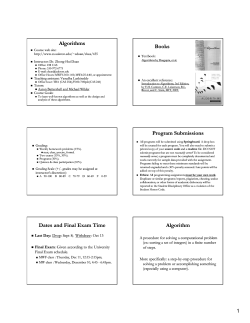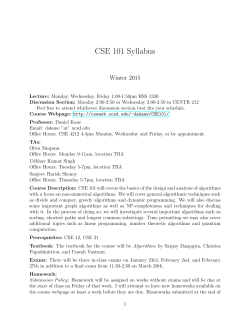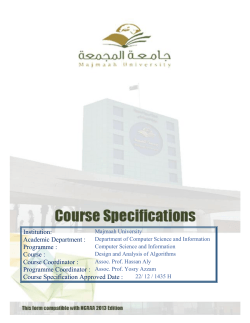
ECS 60 Syllabus - CS-CSIF
ECS 60 Course Syllabus Name Sean Davis Title E-mail Lecturer ssdavis@ucdavis.edu Room 3052 Kemper Winter 2015 Office Hours MWF 8-8:45; MW 1-5; and by appointment. WF 10-noon. None Robert Morning TA rdmorning@ucdavis.edu 53 Kemper Zhige (Isaiah) Xin TA zxin@ucdavis.edu Web page: http://csiflabs.cs.ucdavis.edu/~ssdavis/60/homepage.html Newsgroup: piazza.com/ucdavis/winter2015/ecs60/home E-mail to Sean should only be regarding personal matters and not questions about assignments or tests, and must come from an ucdavis.edu e-mail account. All course questions should be posted to the piazza newsgroup. Required Materials: Weiss, Mark Allen, Data Structures and Algorithm Analysis in C++, 4th ed., Berkeley, CA: Addison Wesley, 2014. Prerequisites: ECS 20 and ECS 40 or equivalents with grade of C- or better. Course objectives: 1. Students will be able to apply algorithm analysis to the operations on data structures and interpret the results. 2. Students will be able to understand and evaluate the operations and possible implementations of the following abstract data types: lists, stacks, queues, binary trees, AVL trees, splay trees, tries, B-trees, hash tables, and heaps. 3. Students will understand the operation and characteristics of the following sorting algorithms: insertion sort, shellsort, heapsort, mergesort, quicksort, bucket sort, radix sort, and external sorting. 4. Students will understand the operation and application of graph algorithms including depth first search, breadth first search, shortest path, minimum spanning tree, network flow, and topological sort. 5. Students will be able choose (and justify) appropriate data structures and algorithms for complex programming tasks. Approximate Course Grading: Homework 15% Programs 25% Two midterms 30% Final 30% Class effort/participation 5% (extra credit) Letter grades will be approximately: A = 90+% ; B = 80-89%; C = 70-79%; D = 60-69%; F <60% Work Input/Output Written Homework: All homework must be stapled together. Each student must do his or her own work. Written homework should be submitted in the ECS 60 slot in 2131 Kemper by 4:00 PM on the date due. Programs: Students should work together in groups of two people to write the programs. The name(s) and e-mail addresses of group members should be in a file named authors.txt. All students may help each other with debugging, but each group must write their own code. Program source code will be submitted using the handin facility of UNIX by midnight on the date due. Each group will submit all of its programs to the handin directory of exactly one of its members. Programs that do not compile will receive no credit. Certain assignments may be submitted to the MOSS program at UC Berkeley for plagiarism analysis. Students that hand in suspicious programs may be reported to Student Judicial Affairs. Each student (not each group) must write his/her own program write-ups for the timetest programs. After the return of grade slips, programs may be edited for five minutes in Sean’s office, and then re-tested for operation, but not design violations. All work: Late work will NOT be accepted without a doctor's excuse. All work will be returned in lecture. All work not picked up in class will be available in my office during office hours. Discussions: W 1:10-2 in 212 Veihmeyer, M 10-10:50 in 1309 Surge 3 Exams: Exams are cumulative, closed book, closed notes. The final will be Thursday, March 19th, 6-8pm in 2 Wellman. Dates 1/5 1/7 1/9 1/12 1/14 1/16 1/21 1/23 1/26 1/28 1/30 2/2 2/4 2/6 2/9 2/11 2/13 2/18 2/20 2/23 2/25 2/27 3/2 3/4 3/6 3/9 3/11 3/13 3/16 Tentative Schedule Subjects Reading Intro, math review, induction. Chapter 1 Complexity, ADTs, lists. Chapter 2, 3.1, 3.2 Lists cont'd, cursor lists Chapter 10.4.2 Skip lists, Stacks and queues. Chapter 12.3, 3.3, 3.4 General trees, B-Trees Chapter 4.1, 4.7 B-Trees cont’d Chapter 4.7 Trees cont’d: Binary trees, BST, tree traversals. Chapter 4.2, 4.3, 4.6 Trees cont’d: AVL trees Chapter 4.4 Trees cont'd: Splay trees, amortized analysis. Chapter 4.5, 11.5 Tries, Huffman encoding Chapter 10.1.2 Amortized analysis Chapter 11.1, 11.5 Hashing: idea, hash functions, separate chaining Chapter 5.1-5.3 Hashing cont’d: open addressing and rehashing Chapter 5.4-5.5 Extendible hash, binary heaps, d-heaps Chapter 5.9, 6.1 – 6.5 Disjoint Set: intro and basic data structures. Chapter 8.1-8.3 Disjoint Set cont’d: smart union, path compression, analysis. Chapter 8.4-8.6 Midterm #1, Chapters 1-5, 10.1.2, 10.4.2, 11.5, 12.3 None Graph Algorithms: Definitions, topological sort. Chapter 9.1-9.2 Graph Algorithms cont’d: Shortest path algorithms Chapter 9.3 Graph Algorithms cont’d: Network flow, minimum spanning tree. Chapter 9.4-9.5 Graph Algorithms cont'd: Minimum spanning tree, DFS Chapter 9.5-9.6 Graph Algorithms cont'd: DFS cont'd, and catch-up. Chapter 9.6 Algorithm design Chapter 10 Sorting: insertion sort, lower bound, shellsort, Chapter 7.1-7.4 Midterm #2, Chapters 1 - 6.5, 8 - 10, 11.5, 12.3 None Sorting: heapsort, mergesort, quicksort, Chapter 7.5-7.7 Sorting: quicksort cont'd, indirect sorting, lowerbound Chapter 7.7-7.9 Sorting: bucket sort, radix sort, external sorting. Chapter 7.10, 7.11. NP Problem and Review Chapter 9.7 Written Homework Assignments Due date (4 PM) # Pts Problems 1 50 1.7ab (must use induction for a), 1.8 abc, 1.12 (must use induction for b), 2.1, 2.2 (provide 1/12 counter example for false), 2.7 a, 2.15, 2.25, 2.31, 2.33 2 12 3.4, 3.20a, 3.25a (Hint: You’ll need some data structure besides the original stack), 3.29, 3.34a 1/14 3 24 4.5, 4.27, 4.35 (Hint: it is recursive), 4.44, 10.3 2/2 4 22 5.1 (a is FILO), 5.2 (rehash to 23), 5.4, 5.27, 11.11 (extra credit) 2/11 5 12 6.1, 6.2, 6.3 (both heaps), 6.14. 2/18 6 12 8.1 (In the case of ties, the second tree is made the child of the first.), 8.2 using deepest node(s) 2/20 7 12 9.1, 9.5, 9.11, 9.15, 9.26 3/4 8 10 7.5a, 7.19, 7.24, 7.30, 7.44 3/16 Programming Assignments Due date (11:59pm) # Program Description 1 Simple ADT Timing Tests, LongInt 1/16 2 BTree Delete program 1/28 3 Advanced ADT Timing Tests, plus ? 2/11 4 Challenge(s) 1 2/25 5 Challenge 2 3/15
© Copyright 2025




















